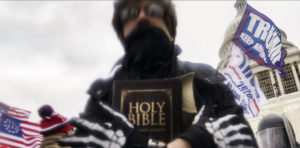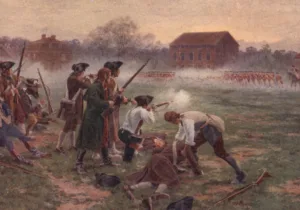On January 6, 2021, I was flying home from a speaking engagement. During my layover, I received an email from a freelance journalist who was writing a story about “Christian imagery used by the protesters who stormed the Capitol building today.” She sent me five images to review, two that were not from the Capitol Hill riot, two from the riot that featured the same Pine Tree Flag (a Revolutionary Era flag that contains the words “An Appeal to Heaven”), and the now-infamous photo of a Goth with skeletal hands holding a Bible.
During the layover, I reviewed videos of the attack and numerous photographs. Trump flags, MAGA hats, and American flags were everywhere, but I could find precious few Christian symbols. I cautioned the reporter, who was writing for the progressive Christian magazine Sojourners, that she should be careful not to make too much of the few Christian images she had sent me. She ignored my warning and published an article about how Christian nationalists had attacked the Capitol. It featured three photographs containing religious images and words, none of which were from the assault on the Capitol. Not surprisingly, the article did not quote me.
Christian nationalism, as defined by its critics, is an ugly phenomenon. In Taking America Back for God, Andrew Whitehead and Samuel Perry explain that it is “an ideology that idealizes and advocates a fusion of American civic life with a particular type of Christian identity and culture” that includes assumptions of “nativism, white supremacy, patriarchy and heteronormativity, along with divine sanction for authoritarian control and militarism.”
If we accept this definition, Christians must soundly reject Christian nationalism. Believers owe our first allegiance to God. Although American Christians may properly be patriotic, we must never conflate the Creator of the universe with the United States of America. And followers of Christ have profoundly Christian reasons for insisting that all men and women must be treated with dignity and respect. I have no doubt that some American Christians hold the sorts of views that Whitehead and Perry describe, but there are very good reasons to question their calculation that 51.9 percent of Americans are Christian nationalists.
The reporter for Sojourners crafted her narrative before she saw much evidence, but that doesn’t mean evidence didn’t exist. Andrew Seidel provides additional evidence in a recent report “Christian Nationalism and the January 6, 2021 Insurrection.” The vast majority of the symbols and language he documents are not taken from the January 6 riot, and he is not above unsubstantiated exaggerations (e.g., “the Christian flag was everywhere on January 6,” emphasis added). Nowhere in his two essays does he acknowledge that most of the symbols among the rioters were MAGA hats, Trump flags, and American flags. By my count, the rioters had as many Confederate flags as they did Christian flags (one of each).
The Christian nationalism report was co-sponsored by the Baptist Joint Committee for Religious Freedom (BJC) and the Freedom From Religion Foundation (FFRF). Both organizations believe that church and state must be strictly separated and that religion must be scrubbed from the public square. For instance, the BJC contended that a cross erected in 1925 to memorialize soldiers who lost their lives in the First World War was unconstitutional, an argument the Supreme Court rejected by a vote of 7-2. Similarly, the FFRF objected to the inclusion of the Star of David in Ohio’s Holocaust and Liberators Memorial. Fortunately, the state ignored the objection.
A commitment to the strict separation of church and state plays a major role in Whitehead and Perry’s measurement of Christian nationalism. They rely on responses to six statements to measure the extent to which one is a Christian nationalist. These include:
- The federal government should enforce strict separation of church and state. [The authors “reverse coded” responses to this question so that strong agreement is recorded in the same way that strong disagreement is recorded for the other five.]
- The federal government should allow the display of religious symbols in public spaces.
- The federal government should allow prayer in public schools.
Unless one understands these statements to be privileging Christianity, strongly disagreeing with the first and strongly agreeing with the next two means one is not a separationist, but that is not the same thing as being a Christian nationalist. Reasonable people can disagree about whether a Star of David should be in a public monument, but there is no reason to think supporters of such monuments are racists, sexists, nativists, etc.—or even that they are improperly conflating God and country. Certainly, supporting this symbol on public land is not evidence of Christian nationalism.
Which brings us to David French. French recently published an essay on the dangers of Christian nationalism in American churches. To document how widespread and dangerous Christian nationalism is, he provides links to both the BJC/FFRF report and Whitehead and Perry’s book. Ironically, both works suggest that French is a Christian nationalist.
Among the myriad of silly claims in the BJC/FFRF report is Andrew Seidel’s charge that the Alliance Defending Freedom (ADF) is “a Christian nationalist legal organization.” If ADF is a Christian nationalist organization, it would presumably be staffed by Christian nationalists. Because David French once worked for ADF, and because he continues to hold views about religious liberty and church-state relations similar to ADF’s, we might reasonably conclude that he is a Christian nationalist.
Or consider French’s likely responses to the statements utilized by Whitehead and Perry. Based on French’s previous work, it seems very likely that he would strongly disagree with the first statement quoted above and strongly agree with the next two (see, for instance, here and here).
Another measure Whitehead and Perry use are responses to the statement, “The federal government should advocate Christian values.” If French understands this as meaning the government should advocate for values like the protection of innocent human life, religious liberty, and justice (values that are Christian, but not distinctly or uniquely Christian), then he would strongly agree. And he is a Presbyterian, which means he is likely a Calvinist, and thus should strongly agree that the success [or failure] of the United States is part of God’s plan. If I am correct, French would earn 20 out of 24 points on the Christian nationalist index—making him a firm “Ambassador,” Whitehead and Perry’s term for a strong advocate of Christian nationalism.
David French is not a Christian nationalist in any meaningful sense of the phrase. Any set of measures that classifies him as such should be treated with caution.
Whitehead and Perry are serious social scientists who make a good faith effort to measure Christian nationalism. Andrew Seidel and other polemical critics should not be taken as seriously. To call the Alliance Defending Freedom a “Christian nationalist legal organization” is simply ridiculous. ADF defends the ability of all citizens, Christian and non-Christians alike, to act upon their religious convictions. To be sure, the organization does not embrace the sort of strict separation between church and state that would require the demolition of a World War I-era cross on public land, but neither do Stephen Breyer and Elana Kagan. If we are going to call these two justices Christian nationalists, the phrase has become meaningless.
Christian nationalism is a thing, but it is not the thing many of its critics describe. Christians concerned about Christian nationalism should be wary of looking to Sojourners, the Baptist Joint Committee for Religious Freedom, and the Freedom From Religion Foundation for information about this phenomenon.










 Sponsor a student for Christianity & National Security 2024
Sponsor a student for Christianity & National Security 2024